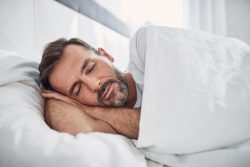Does Sleep Apnea Cause Panic Attacks?
February 17, 2021
Imagine this. You suddenly wake up short of breath, your heart pounding and your body trembling. You are terribly frightened and sweating. What is it? Such an experience is an example of a panic attack, which is a common occurrence in many adults. Panic attacks can be attributed to a number of different underlying issues, and recent research has even established a possible connection between them and sleep apnea. Let’s discuss these findings and then talk about a possible solution to both panic attacks and sleep apnea.
Carbon Dioxide and Panic Attacks
For many years, scientists have known that carbon dioxide can trigger responses in people with anxiety disorders. Only recently, however, researchers at the University of Iowa found a molecular explanation for such responses. They found that inhaling carbon dioxide increases brain acidity, which in turn instigates the release of a protein that plays a central role in one’s anxiety and fear.
A logical extension of the study’s finding relates to how we breathe. We do not necessarily have to breathe in carbon dioxide to experience a slight degree of poisoning from it. The human respiratory system works on an exchange of gases. We inhale oxygen, and we exhale carbon dioxide. Improper breathing can stop us from exhaling as much carbon dioxide as we should. Short, shallow breaths can cause a buildup in our system that in turn triggers a fear response.
Sleep Apnea and Panic Attacks
Sleep apnea hinders proper breathing at night, while you are supposed to be soundly sleeping. The pauses in breathing that it causes may lead to carbon dioxide retention, which may cause nocturnal panic attacks. Of course, that is not the only possible link between sleep apnea and panic attacks. Sleep apnea contributes to sleep deprivation, which can increase daily stress levels. Stress is a common trigger for panic attacks.
What You Can Do
You may be able to stop your panic attacks — or at least lessen their frequency — by taking measures to improve your breathing. During the day, deep breathing exercises, as well as just taking a few minutes to relax and reset, can do a lot to keep you calm and focused.
If you believe that sleep apnea is a factor in your panic attacks, a visit to a sleep specialist is in order. They can help you arrange for sleep testing, which will provide you with a diagnosis for your sleep issues. If your results show that you have sleep apnea, treatment can be prescribed by your sleep specialist. Oral appliance therapy or a CPAP machine may be able to help you breathe easily throughout the night and thus prevent future panic attacks.
Do panic attacks plague you? If so, improvements to your breathing may be just what you need to live a calmer, happier life.
About the Author
Dr. Kenneth Mogell, a board-certified specialist in sleep medicine with over 10 years of experience treating sleep breathing disorders is the practice’s founder and primary practitioner. The practice has four South Florida locations: Boca Raton, Melbourne, Vero Beach, and Jupiter. To learn more about Florida Dental Sleep Disorders and Dr. Kenneth Mogell, contact our team at 844-294-7559.
